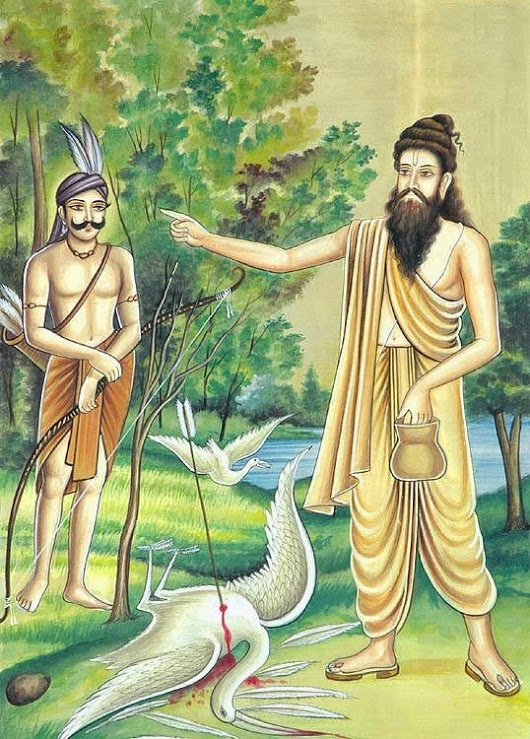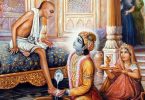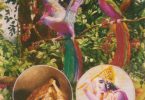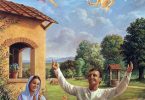Question. Was there some significance to Valmiki’s cursing the hunter, at the beginning of the Ramayana?
Answer by HH Romapada Swami:
In summary, the cursing of the sage was a result of:
1. Sage Valmiki being aggrieved by the heinous act
2. Upon Brahma’s inspiration, Valmiki uttered a verse which was a curse, as well as:
a. An auspicious invocation for the Ramayana glorifying Lord Rama
b. A summary of the different kandas or cantos of Ramayana
c. A poem that evoked pathos, namely sorrow, the primary theme of the Ramayana and the lila of Lord Rama. Rupa Goswami identifies this sorrow karuna-rasa.
According to the commentaries, Valmiki included the pastime of the curse to indicate the extraordinary circumstances and empowerment under which the epic Ramayana was composed.
+++
Given below is a detailed reply to the above question, with excerpts from Valmiki Ramayana, Acharyas’ commentaries on Ramayana, references to Srila Prabhupada’s writings, as well as with commentary taken from H. G. Vidvan Gauranga Prabhu’s book (in blue font). Interested readers can buy the book from: https://www.amazon.in/dp/B07R8KJR2C
———-
In Chapter 1 of Bala Kanda, Valmiki asked Narada who possessed 16 exceptional qualities amongst those who were present at the time of his asking the question. Narada replied saying that Rama possessed these qualities. Also, Narada narrated a summary of Ramayana to Valmiki in about 68 verses and also narrated the benefit of hearing the activities of Rama.
In this regard, Vidvan Gauranga Prabhu writes in his commentary:
The most merciful Valmiki desired to elaborately describe the activities of Lord Rama that had been briefly stated, for this is the practice of the learned: istam hi vidusam loke samsa vyasa dharanam. In order to attract the attention of learned readers, the sage (Sri Valmiki) desired to reveal the extraordinary characteristics of the author of this work, the extraordinary characteristics of the mode of composition of this work and the extraordinary characteristics of this work itself. In this second chapter, he describes the extraordinary characteristics of the author. An author is extraordinary when he is supremely trustworthy. A person who perceives reality as it is and conveys all that he perceives as it is, is trustworthy. Sri Valmiki is supremely trustworthy for he received benedictions to this effect from the grandfather of the universe, Lord Brahma. He now reveals the events that led to Lord Brahma’s blessing him.
When the great sage Valmiki went to take bath, he looked at the extensive forest all around the Tamasa River. He was astonished when he saw an inseparable couple of kraunca birds cooing in lovely melodious notes. (His act of looking at the extensive forest by the sage of controlled senses was conducted by the will of a superior authority; it is a cause for astonishment.)
Even while the sage was watching, a hunter – certainly sinful, cruel, and endowed with his natural enmity towards all creatures – killed one of the kraunca bird couple, the male bird. Seeing the male bird shot by the hunter and thus rolling on the ground with blood all over its body, its wife cried piteously. The female kraunca bird was separated from her husband, her constant companion, who was united with him in body and mind. Seeing the male bird violently killed by the hunter, compassion arose in the sage of a dharmika mind. (The sage was an adherent of Vedic dharma by nature)
According to Bhagavad-gita 16.2, daya bhutesu or “compassion for all living entities” is a transcendental quality belonging to godly persons endowed with a divine nature.
Seeing the male bird violently killed by the hunter, compassion arose in the sage of a dharmika mind. Then, the twice-born sage saw the adharmika act of the hunter and the crying female krausca bird. Because she was thus the object of his compassion, he uttered the following words:
ma nisada pratistham tvam agamah sasvatim samah
yat krauacamithunad ekam avadhih kamamohitam
ma = never; nisada = O hunter; pratistham =a fixed position for enjoyment; tvam = you; agamah = may attain; sasvatih = for unlimited; samah = years to come; yat = for; kraunca-mithunat = of the kraunca bird couple; ekam = one; avadhih = you have have killed; kama-mohitam = that was absorbed in the sport of mating.
O hunter, may you never attain a fixed position for enjoyment for unlimited years to come, for you have killed one of the kraunca bird couple that was absorbed in the sport of mating!
The first line can also be split as follows: ma nisada pratistham tv ama gamah sasvatih samah. Here, ama would mean, “O inauspicious one,” referring to the hunter. The meaning of the line would then be: “O inauspicious hunter, may you never attain a fixed position for enjoyment for an unlimited number of years.” The first half of the verse states the curse, while the second half of the verse states Valmiki’s reason for cursing the hunter. He indicates that the hunter would never attain a fixed position of enjoyment, like the male bird he killed.
As it will become obvious later in this chapter, this is the first verse uttered by Valmiki by the mercy of the four-headed Brahma. The previous acaryas assert that as such it cannot merely be a verse expressing a curse and that it is also an invocation of auspiciousness in glorification of the Supreme Personality of Godhead. Therefore, another meaning of this verse is as follows:
Nisada can also mean “residence.” Ma can also refer to Laksmi, the goddess of fortune. Ma-nisada would then be one word meaning “O residence of the goddess of fortune!” The remaining words in the first line would then yield this meaning: “May You attain glory for an unlimited number of years, for all time.”
Kraunca-mithunat can refer to the crooked rakaasa Ravana and his mate Mandodari. One of them (ekam), Ravana, was overcome by lust (kama-mohitam) and kidnapped Sita-devi. And avadhih: “You killed him.”
The complete translation of the verse would then read as, “O Lord Visnu (Lord Rama) who is the resting place of Goddess Lakshmi/Sita, may you get the fame that will last for ages for killing one among the couple of demons (namely Ravana and Mandodari) who was overtaken by lust.” Thus, the sage Valmiki has invoked auspiciousness by remembering his worshipable deity. Thus, this verse serves as an auspicious invocation / mangalacarana.
That very verse briefly hints at the events to be related later in this poem. Ma-nisada, “O residence of the goddess of fortune,” is a reference to the events of the Bala-kanda (Canto 1) that culminate in the wedding of Sita-devi. Pratistham tvam agamah, “May You attain glory,” is a reference to the glory of carrying out the orders of His father, as set out in the Ayodhya-kanda (Canto 2). Sasvatih samah, “for an unlimited number of years,” reinforces Lord Rama’s maintaining His glory in the forest while in exile by His carrying out His promises to the sages residing there; this is a reference to the Aranya-kanda (Canto 3). Kraunca-mithunat can refer to the two crooked animals, Tara and Vali; Lord Rama killed one of them, Vali, who was overcome by lust for Sugriva’s wife (kama-mohitam), and this is a reference to events to be described in the Kiskindha-kanda (Canto 4). Kraunca-mithunat can also refer to “the emaciated couple,” a reference to Sita and Rama themselves, who became emaciated out of distress upon being separated from each other; the meaning would then be, “You gave her extreme pain, (almost) killing her, one of the couple, when she was separated from You,” and this is a reference to Sita-devi’s extreme pain of separation from her Lord as recounted in the Sundara-kanda (Canto 5). Taking kraunca-mithunat to refer to Mandodari and Ravana, it refers to the Yuddha-kanda (Canto 6) when Lord Rama killed the one overcome by lust, Ravana. Kama-mohitam can also refer to the one member of the couple Sita-Rama who became obssessed with the desire to see the wives of the sages of Dandakaraṇya—Sita-devi— and Lord Rama pained her by separating her from Him; this is a reference to events to be described in the Uttara-kanda (Canto 7).
One might object: How can the sage curse a hunter, whose hereditary duty (kula-dharma) was to kill deer, birds, and other creatures, and who was hence offenseless? Moreover, Lord Rama Himself will affirm while killing Vali that it is indeed offenseless on the part of such a person to kill creatures of the forest.
True. Nevertheless, the sage’s intention is to establish that to kill an animal when it is overcome by the desire to mate is certainly wrong. And he indicates this by using the word kama-mohitam. Therefore, in the Mahabharata, a sage tells Pandu that no learned person should kill an animal in the forest while engaged in mating and indicates that such an act is sinful.
When Sri Valmiki was distressed, or in ‘shoka’ by the lamentation of a female kraunca bird, he had uttered a verse—a sloka—that could be sung to the accompaniment of a vina and other musical instruments. After hearing that verse recited by the sage within his mind, Lord Brahma spoke to him, the best of sages. Sri Brahma was smiling that the sage was unaware that the sloka had appeared on his tongue by Brahma’s own arrangement.







